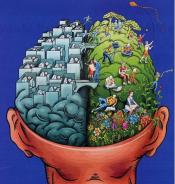Can CRISPR–Cas9 Boost Intelligence?
By Jim Kozubek,
Scientific American
| 09. 23. 2016
Not now, certainly, but maybe someday—although there are plenty of hurdles to overcome first
A letter was recently published in Nature on 329,000 young people identifying 74 genetic variants—spelling mistakes in single nucleotides in the six billion letter human genome—which can be used to predict nearly 20 percent of the variation in school years completed, a quantitative trait of fortitude which is correlated to general intelligence, and which you can learn about by sequencing your own genome.
Staple that to your college application.
Even before the “molecular age,” we were on guard for the slightest tips that show we are more or less valued than our peers. But there was also caution from the academics that there was actually very little we could do to leverage our biology for improvement. In 1924, the Harvard geneticist William Castle quipped that “we are scarcely as yet in a position to do more than make ourselves ridiculous in this matter. We are no more in a position to control eugenics than the tides of the ocean.”
Enter Crispr-Cas9, the first pair of tiny molecular...
Related Articles
By Emma McDonald Kennedy
| 11.24.2024
Gig work in childcare, nursing, and transportation; non-invasive prenatal testing; gene editing; and space expeditions can all be attributed to one mistaken, pervasive assumption: that “we can innovate our way out of the thorniest problems, including reproductive ones” (22). In Reproductive Labor and Innovation: Against the Tech Fix in an Era of Hype, feminist political theorist Jennifer Denbow demonstrates why the U.S. has put so much of its hopes, and its money, on technological “innovations”––and why that hasn’t addressed...
By Tamsin Metelerkamp, Daily Maverick | 11.18.2024
The National Health Research Ethics Council (NHREC) has confirmed that heritable human genome editing (HHGE) remains illegal in South Africa, after changes in the latest version of the South African Ethics in Health Research Guidelines sparked concern among researchers that...
By World Health Organization, World Health Organization | 11.20.2024
By Bernice Lottering, Gene Online | 11.08.2024
South Africa’s updated health-research ethics guidelines, which now include heritable human genome editing, have sparked concern among scientists. The revisions, made in May but only recently gaining attention, outline protocols for modifying genetic material in sperm, eggs, or embryos—changes that...




